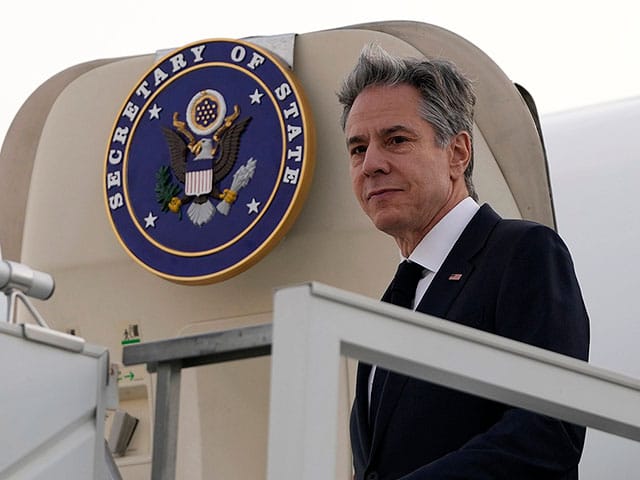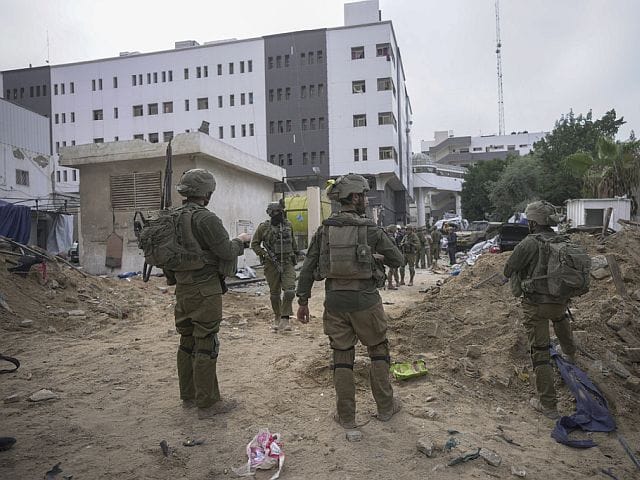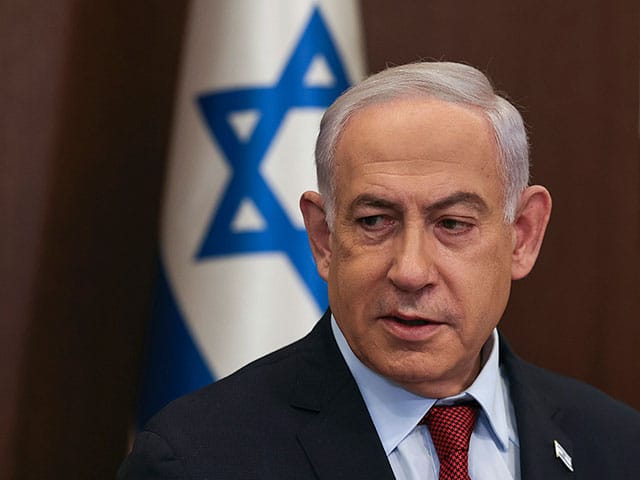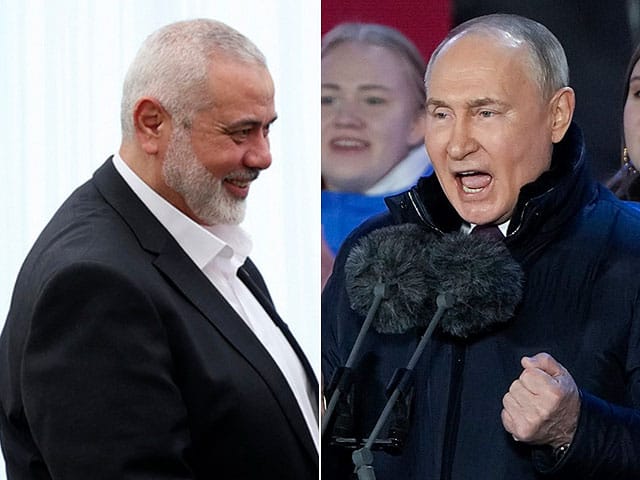Expert on Arab affairs Marianna Belenkaya talks about Antony Blinken's trip to the Middle East, opinion polls among Palestinians, and the Arab world's attempt to form a unified front
This week shines a spotlight on US Secretary of State Antony Blinken's sixth visit to the Middle East since the beginning of the conflict between Israel and Hamas. Amid Washington's continuous efforts to achieve a ceasefire in Gaza and prevent imminent military operations in Rafah, his presence marks a pivotal moment. Meanwhile, Arab countries actively lobby their position on this issue, striving to present a united front.
A recent public opinion poll among Palestinians shows a waning support for armed resistance, though Hamas's actions continue to receive substantial approval. Furthermore, the first visit of a high-ranking Hezbollah official to the UAE draws attention, potentially leading to the increased influence of Abu Dhabi on internal affairs in Lebanon and the broader regional context.
Blinken's visit to the Middle East
US Secretary of State Antony Blinken's sixth visit to the Middle East since the outbreak of war between Israel and Hamas included a stop in Jeddah to meet with Saudi Arabia's Crown Prince Mohammed bin Salman and visits to Egypt and Israel. In Cairo, Blinken had discussions with Egyptian partners and representatives of six Arab nations. This assembly featured the foreign ministers of Egypt, Jordan, Saudi Arabia, Qatar (also the Prime Minister), the UAE Minister of State for International Cooperation, and the Secretary General of the Executive Committee of the Palestine Liberation Organization.

Arab media sources indicate that Blinken aimed to gain Arab support for another American plan aimed at securing a ceasefire in Gaza for at least six weeks. These talks unfolded amid parallel discussions on the subject in Qatar. Moreover, during his visit, Blinken affirmed the US commitment to propose a UN Security Council draft resolution for a ceasefire in Gaza. Until now, Washington has opposed such resolutions. The US links the ceasefire to the release of Israeli hostages held in Gaza.
Egyptian sources from the Qatari news outlet The New Arab, renowned for its comprehensive coverage among many Arab media outlets since the start of the war, reveal that Blinken's discussions extended to the post-war future of the Gaza Strip. In Cairo, there's a prevailing belief that these proposals have secured Israel's approval. Central to the discussions is the formation of an Arab-led administration that would assume supervisory and direct governance roles over local leaders.
Sources from The New Arab highlight that Cairo has once again informed the United States and Israel of its refusal to play a direct management role in the Gaza Strip. Egypt's commitment remains solely to supporting and assisting the official Palestinian administration. Similar signals are coming from other Arab capitals.
However, the United States is actively exploring the possibility of handing over control of the Gaza Strip to a reformed Palestinian Authority, a move Israel has so far resisted. Prime Minister Benjamin Netanyahu has repeatedly stated that he will not cooperate with Fatah, whose representatives hold a key position in the PA. Despite this, at the end of the week, Israel's Channel 13 unveiled reports of a secret meeting between high-ranking Israeli officials and Fatah representatives.
At the same time, Cairo is ready to step up security coordination along its border with the Gaza Strip. This effort involves boosting surveillance with additional cameras and targeting the tunnels that, as per Israeli reports, link Egypt and Gaza. The Americans and Cairo have actively discussed these measures. Furthermore, The New Arab also highlights the US hopes that enhancing security along the border might serve as a persuasive argument against an Israeli military operation in Rafah.

After Secretary of State Antony Blinken's discussions in Cairo, Egyptian sources have concluded that these American initiatives have not succeeded. Consequently, the American and Arab sides are now concentrating on decreasing the civilian population in Rafah. The possibility of moving displaced people to central Gaza Strip locations and the Strip's northern areas, as designated by the Israeli military, is actively discussed.
Cairo has once again rejected the idea of temporarily hosting a part of the Gazan population but has not dismissed the potential need to do so in the future, initiating preparations for the possibility. This plan involves accommodating up to 150,000 people and funding from the EU and the Arab monarchies of the Persian Gulf. This scenario, reported in the Arab media a few months ago, apparently remains relevant.
During his Middle Eastern trip, Antony Blinken displayed optimism regarding the temporary ceasefire and the negotiations for the exchange of Israeli hostages for Palestinian prisoners. CNN highlighted this week that, at the beginning of March, Blinken urged Qatar to threaten Hamas with expulsion from Doha if the Gaza ceasefire talks stall.

Hamas's political office relocated to the Qatari capital from Damascus in 2012. This information was reportedly delivered to Qatari Prime Minister and Foreign Minister Mohammed bin Abdulrahman bin Jassim Al Thani during his visit to Washington. Shortly after, The Wall Street Journal, referencing unnamed Hamas and Egyptian officials, reported that Qatar had warned it might expel Hamas's leadership from Doha unless they convinced their Gaza members to accept a deal with Israel. While Hamas has publicly denied these claims, there has been no formal confirmation from Doha on the matter. Nevertheless, negotiations between Hamas and Israel in Qatar have restarted this week following a short pause.
Survey among Palestinians
Another Palestinian public opinion poll was published on Wednesday against the backdrop of US efforts to find a compromise with Israel concerning the near and distant future of the Gaza Strip. It was conducted by the Ramallah-based Palestinian Center for Policy and Survey Research under Dr. Khalil Shikaki. The reliability of polls in Palestinian territories, especially in the Gaza Strip, is met with skepticism by many sociologists. However, these are the only data available that allow for any assessment of the opinions there over many years.
The main conclusion is that support for Hamas declines in the West Bank and the Gaza Strip as humanitarian conditions in the Gaza Strip worsen. At the same time, a convergence of views between residents of the two disconnected territories is noted.
According to the survey, Palestinians show less support for armed resistance (46% versus 63% at the end of last December). Even before the war, it was higher (53% in September 2023).
While the level of support for Hamas's attack on Israel on October 7 remains almost unchanged, currently standing at 71% versus 72% in December, it appears at first glance that nothing has changed. However, there is a significant detail. Back then, the actions of Hamas on October 7 were supported by 57% of Gaza Strip residents, while in the West Bank, the figure was 82%. Now, the figure is the same across both territories at 71%. This trend is also observed in other spheres.

Moreover, 59% of respondents believe that Hamas will continue to govern the Gaza Strip. Satisfaction with Hamas also remains high, at 70%.
Among Palestinian politicians, Marwan Barghouti consistently remains popular. He is currently serving five life sentences in an Israeli prison for terrorism. His name alone could attract Palestinians to vote if elections were possible. Moreover, without Barghouti's participation in the elections, the head of Hamas's politburo, Ismail Haniyeh, would win, regardless of his opponent.
In light of these and other responses, it's too early to conclude there are significant shifts in Palestinian sentiments. Their attitudes fluctuate with the situation. Yes, there's a visible war weariness, but an alternative to Hamas does not yet appear evident. The question remains: what if Palestinians genuinely saw other options they could believe in? As long as they are confident in Hamas's victory and its continued governance in Gaza, the situation is unlikely to change significantly.
Lebanon and the UAE
Another significant regional event that demands attention is the visit of Wafiq Safa, Hezbollah's head of communication and coordination, to the UAE. This visit is noteworthy as it is the first time such a high-ranking representative of the Lebanese terror group has traveled to this Arab country. Remarkably, Abu Dhabi, unlike many Arab capitals, has officially designated Hezbollah as a terrorist organization. In this context, as reported by the Lebanese news outlet L'Orient-Le Jour, the event has caused quite a stir in Beirut.
The visit's official goal is to look into the cases of seven Lebanese citizens detained in the UAE, suspected of having connections to Hezbollah. Yet, the broader implications and context of the visit carry paramount importance.
This visit is another sign of the improving relations between Abu Dhabi and Tehran that became warmer in 2021 when contact between the Emiratis and Hezbollah began. Additionally, the earlier reconciliation between the UAE and Syria, which took place a few years ago, should not be overlooked. Damascus has had a considerable hand in facilitating preparations for this visit.
The visit is seen regionally as part of the UAE's strategy to expand its influence in the area. Understanding the interplay between Damascus and Tehran's interests versus those of the USA and France is crucial in this scenario, especially since the latter group has been actively seeking to reduce escalation between Israel and Hezbollah.

In addition, the dynamics of Israeli-Emirati relations, which have remained essentially unchanged since October 7, and the UAE's actions regarding Palestine warrant attention. The Emirates is home to Mohammed Dahlan, the former head of the Palestinian Security Force in Gaza. Lebanese media have reported that Dahlan has engaged in numerous discussions in Doha and Cairo with Hamas leaders residing in Qatar, aligning with coordination meetings between Hezbollah and Hamas representatives.
Lebanese media underscore remarks made by US Special Envoy Amos Hochstein, who stated that Washington is relying on the support of Persian Gulf countries to strengthen the Lebanese army in southern Lebanon once hostilities between Israel and Hezbollah end. This strategy is also expected to facilitate additional financial investments in the country, presumably involving Qatar and the UAE.
Given that the situations in Lebanon and the Gaza Strip are interconnected, the UAE's activation, which, unlike Qatar and Egypt, did not participate in the negotiations on a ceasefire between Israel and Hamas, could lead to interesting outcomes. Moreover, the close partnership between the UAE and Russia should not be overlooked.












